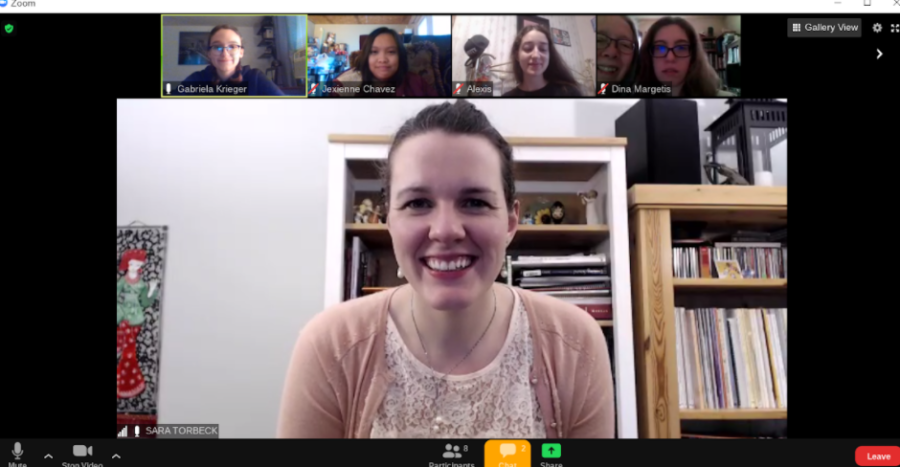Passion for music perseveres online
Band and choir classes are still meeting online in an effort to mitigate risks. Virtual meeting apps allow for continuation of rehearsals but add challenges.
October 26, 2021
As an increasing number of Americans become vaccinated, the world- which, for a period of time, appeared frozen in orbit- seems to be stirring back into rotation. The majority of schools have traded in online learning in effort to meet in-person; extracurricular sports have returned to being teams; large gatherings of vaccinated people are being approved by doctors and state governors.
However, for musical activities such as band and choir, such a return to normalcy borders on impossible. As doctors and scientists first began their research into the biology behind the covid-19 virus, it quickly became known that the disease spreads through oral droplets and respiratory routes.
This research made it increasingly apparent that both the playing of musical instruments and singing in a choral setting could be dangerous or potentially fatal.
“While social distancing is effective in normal social interactions, singing can produce a substantially larger number of respiratory droplets and aerosols than speaking, as it is louder and sustained for longer durations,” states the Infectious Disease Society of America.
“The biggest challenge is the fact that we can’t sing together due to internet lag, and so rehearsing together is a very different kind of rehearsal compared to your traditional type of practice,” said Oakton choir director Sara Torbeck. “It’s all about syncing up, and when you’re dealing with technology that restricts that, you have to get creative.”
As the pandemic crescendoed into the catastrophe we are familiar with today, this fear of disease transmission became increasingly valid. When coupled with the concern about the spit swabs of woodwind instruments, the spit valves of brass instruments, and the ambient airflow of singers, the hopes of creating music together during the pandemic were quickly dashed.
Honorably, band and and choir directors have sacrificed ensemble rehearsals in effort to mitigate risks and keep their students safe. While the necessity of these actions is indisputable, they come with their own set of challenges.
Gone are the days of harmonizing, of blending notes to create one unified sound, of feeling the music grow and swell like a tangible entity– these days, songs are performed in the confines of bedrooms. Now, smiles and encouragement are exchanged through a camera lens.
Despite all the obstacles that instantly spring to mind when thinking about the impact of the covid-19 crisis on band and choir, it could be argued that virtual learning has revolutionized the world of music education. “We discussed music history and sang songs that correlated with what we learned in class. I learned a lot having the music programs tailored to different eras,” said Torbeck.
While ensemble members miss the camaraderie and friendship that came along with singing and playing in a group, remote learning has surprised students with its unforeseen benefits.
“It’s really nice being in each singer’s ear, and as a person whose sight reading isn’t her strong suit, it’s nice to have a really strong vocalist who has the accurate pitches and vowel shapes so that I can make sure I’m emulating that,” said long-time Oakton choir member Dina Margetis.
Throughout this monumental period of turmoil and uncertainty, Oakton’s music directors have done their utmost to continue making the best out of an unfortunate situation. The musical community has proven to be an unstoppable force: if they can manage to make music safely throughout such a turbulent time, they can manage anything.
When detailing her experience of teaching choral education throughout a pandemic, Torbeck encapsulated it perfectly: “We must continue to make music,” she said. “We must find a way.”


